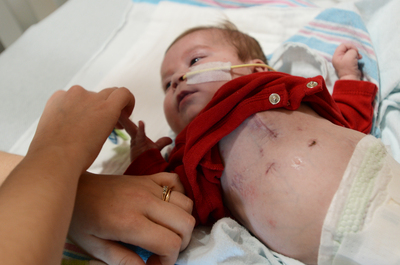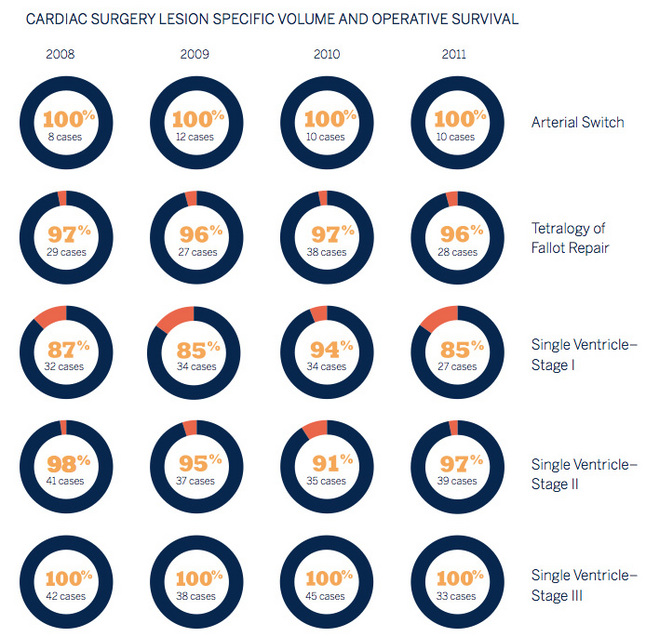C.S. Mott Children's Hospital to publish pediatric heart surgery outcomes online

Tabitha Rainey, 24, of Lexington, Ky., stands over her 4-month-old son Waylon as he lies in a hospital bed at C.S. Mott Children's Hospital on Thursday, Feb. 14, 2013. Waylon, who underwent surgery for congenital heart disease, was transferred from Kentucky Children's Hospital after it discontinued its pediatric heart surgery program.
Melanie Maxwell | AnnArbor.com
The move comes in the wake of a CNN investigation into the deaths of infants that had received heart surgeries at Kentucky Children's Hospital in Lexington, Ky.
The Kentucky hospital came under fire in early August as it initially declined to release mortality rates for pediatric patients that had received heart surgery. The pediatric heart surgery program at Kentucky Children’s Hospital had been suspended in October, according to a CNN report.

Tabitha Rainey shows her son Waylon's scars Feb. 14, 2013 from a January surgery at Mott Hospital. Waylon suffers from congenital heart disease and will most likely have to have a heart transplant before he is 18.
Melanie Maxwell I AnnArbor.com
The University of Michigan Health System states the impending release of its data to its website was not prompted by the scrutiny placed on the pediatric surgery program at the Kentucky hospital.
“This is an initiative we began last year as a part of our ongoing efforts to strengthen relationships with physicians who refer patients to us and as part of our ongoing effort to be transparent,” according to a statement from UMHS.
The health system is anticipating that it will publish figures from 2007 to 2012. UMHS is actively working to put the information online, but does not have a date when the information will go live, officials said.
Though UMHS has previously published the outcomes for its pediatric patients who have undergone heart surgeries in documents kept on record within UMHS, it has not yet posted them online on its Quality and Safety website. The most recent report UMHS was able to provide AnnArbor.com was of 2011 data.
Outcomes for adult and pediatric patients that undergo a number of other procedures at UMHS are publicly available on the site. For pediatric patients, UMHS has published data on outcomes for children in intensive care units, those with lung conditions, transplant recipients and trauma patients.
A total of 801 children underwent heart surgery at Mott in 2011, compared with 927 in 2010 and 859 in 2009.
Mortality rates for pediatric heart surgery procedures in 2011 range from 0 percent to 15 percent, depending on the procedure.
Friday, Kentucky Children’s Hospital released data indicating the overall mortality rate in its pediatric heart surgery program ranged from 4.5 percent to 7.1 percent from 2008 to 2012, CNN reported.

Survival rates of pediatric patients that had undergone heart surgery at C.S. Mott Children's Hospital from 2008 to 2011.
Courtesy of UMHS
Amy Biolchini covers Washtenaw County, health and environmental issues for AnnArbor.com. Reach her at (734) 623-2552, amybiolchini@annarbor.com or on Twitter.


Comments
SonnyDog09
Tue, Aug 13, 2013 : 5:05 p.m.
We need openness with regards to Quality Statistics and Costs. Any customer should be able to simply and easily find out how much a procedure will cost.
TinyArtist
Tue, Aug 13, 2013 : 12:26 p.m.
Thanks for the 'CNN investigation' link, which helps answer a lot of questions.
missy
Tue, Aug 13, 2013 : 12:23 p.m.
Recently I read, Unaccountable What Hospitals Won't Tell You and How Transparency Can Revolutionize Heath Care by Dr. Martin Makary. (Surgeon at Johns Hopkins Hospital) A fascinating book calling for more transparency by both hospitals and physicians. "Political partisans can debate the role of government in fixing health care, but for either public or private approaches to work, transparency is the crucial prerequisite. And openness and accountability are values that Americans across the political spectrum agree on. The reforms advocated in this book are neither conservative nor liberal. To make transparency effective, government, insurance companies, hospitals, and doctors' groups must play a role in making fair and accurate reports available to the public. Add by doing so, it will unleash the power of the free market to create positive change. When hospitals have to compete on a level playing field, all of them will be forced to improve how they serve their patients." Patients and their families should be able to go online and enter their medical condition or proposed operation and review the hospital wide complication rate for that treatment or procedure. I am happy to see U of M Hospitals taking this step for Pediatric Heart Surgery.
trespass
Tue, Aug 13, 2013 : 10:35 a.m.
The federal government has required hospitals to publish data on transplant surgeries for a number of years. The feds have worked extensively to "normalize" the data to compensate for such things as patient selection (does the transplant program only take the patients with the lowest risk). Thus, it is always good for a hospital to offer patients more information but it is difficult to compare hospitals' data because it can be affected by many factors and in some cases can be manipulated to make one program look better than their competitors. So it is a good sign when a hospital is willing to publish their data but be careful not to think a few percentage points difference makes one hospital better than another.